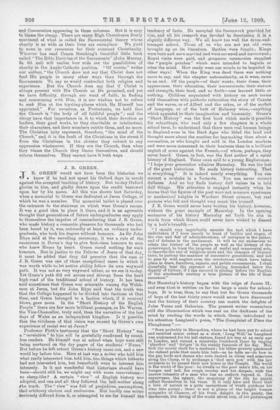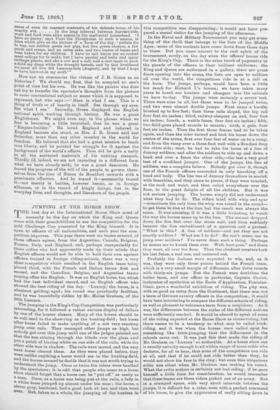J. R. GREEN.
T R. GREEN would not have been the historian we 0 • know if he bad not spent his Oxford days in revolt against the accepted teaching of history. But to-day Oxford glories in him, and gladly draws upon the credit bestowed upon her by his name. All this was shown last Saturday, when a memorial to Green was dedicated at Jesus College, of which he was a member. The memorial tablet is placed over the entrance to the staircape on whieh were Green's rooms. It wee a good idea to place it there, and it is an agreeable thought that generations of future undergraduates may apply to themselves the impetus of remembering that J. R. Green, who made history a romantic pleasure for thousands who had been bored by it, was, outwardly at leaet, an ordinary under- graduate, who took his degree without honours. As Sir John Rhys said at the unveiling ceremony, it was a rule of the examinere in Q-reen's day to give first-class honours to men who knew Hume by heart. Green cared nothing for such honours. But in justice to the Fellows or Jesus of that day, it must be added that they did perceive that the case ot J. R. Green was one of those exceptional eases in which it was worth while to let native ability follow its own wayward path. It was not so very wayward either, as we see it to-day. Yet green's path did out across and diverge from the hard high road of the traditional school of history. It has been said sometimes that Green was miserable among the Welsh- men at Jesus, but Sir John Rhys said that the truth was that the College happened to be divided into factions at that time, and Green belonged to a faction which, if it received blows, gave more. In the "Short History of the Euglish People" there are few more brilliant passages, as Dr. Warren, the Vice-Chancellor, truly geld, than the narrative of the last days of Wales as an independent kingdom. Is it possible that the vividness of that vision was caused by Green's own experience of racial war at Jesus P Professor Firth's testimony that the "Short History" was a revelation" to him will be gratefully confirmed by count- less readers. He himself was at school when boys were still being nurtured on the dry pages of the students' "Hume." But before be left school Green's history came out, and a new world lay before him. Here at last was a writer who told him what really interested him, told bhp, too, things which hitherto had not interested him, but henceforth were to interest him intensely. Is it not wonderful that historians should have been—should still be, we might say with some reservations— so sheep-like P A certain " view " of English history was adopted, and one and all they followed the bell-wether along dhe track. The " view" was full of prejudices, assumptions, thel arbitrary choices and exclusions. But hardly one writer neriously differed from it, or attempted to see for himself the. tendency of facts. He accepted the framework provided for him, and all his research wee devoted tg decorating it in a slightly differept way. We all know too well the drum-and- trumpet school. 'hoe of us who are not yet old were brought up on its literature. Battles were fought; Kings were born and were married and were crowned and uncrowned ; Royal vieits were paid, and gorgeous ceremonies supplied
the "purple patches" which were intended to beguile or relax the mind. How ready were our mind e to be beguiled in other ways! When the King Was dead there was nothing more to say, and the chapter automatically, as it were, came to an end. Of the people—of their wants, their dress, their
appearance, their education, their amusements, their stature and strength, their food, and so forth—one learned little or nothing. Children acquainted with history on such terms told themselves with pathetic reiteration the story of Canute and the waves, or of Alfred and the cakes, or of the surfeit of lampreys, or of the butt of Malmsey wine,—anything which appealed to their imagination and humanity. Green's "Short History" was the first book which made it possible for schoolboys, who read only a few chapters in a whole school term, to underetand that there were real human beings in England even in the Dark Ages who tilled the land and thought more about the weather for haymaking than about a coronation, or who bought and sold in the London markets and were more concerned in their business than in a brilliant exploit of arms against the French,—of whom, perhaps, they never heard. Green, in fact, was the first author of a social history of England. Taine once said to a young Englishman: "I hope your generation admires Macaulay. He was the last of the great historians. He made history interesting. That is everything." It is indeed nearly everything. You can
correct a mistake in a footnote. You can never correct dullness. And no boy finds history dull unless he is told dull things. His attention is engaged instantly when he learns that the figures of the past were not museum specimens or mechanical knights in Wardour Street armour, but reel persons who felt and thought very much like himself.
J. R. Green would never have writtee his history, however, without the great example of Macaulay. In the opening sentences of his history Macaulay set forth his aim in words from which Green could never have wished to dissent by a hair's-breadth:—
" I should very imperfectly exepute the task which I have undertaken if I were merely to treat of battles and sieges, of the rise and fall of administrations, of intrigues in the palace, and of debates in the parliament. It will be My endeavour to relate the history of the people as well as the history of the government, to trace the progress of useful and ornamental arts, to describe the rise of religious sects and the changes of literary taste, to portray the manners of successive generations, and not to pass by with neglect oven the revolutions which have taken place in dress, furniture, repasts, and public amusements.. I shall cheerfully bear the reproach of haying descended below the dignity of history, if I can succeed in placing before the English of the nineteenth century a true picture of the life of their ancestors."
But Macaulay's history began with the reign of James II., and even then is written on far too large a scale for school- boys. It is true, then, to say that but for Green thousands of boys of the last thirty years would never have discovered that the history of their country can match the delights of Jules Verne and Gaboriau. The present writer remembers still the illumination which was cast on the darkness of his mind by reading the words in which Green introduced to his attention Langland's poem, "The Complaint of Piers the Ploughman" :—
"Born probably in Shropshire, where he had been put to school and received minor orders as a clerk, 'Long Will,' as Langland was nicknamed for his tall stature, found his way at an early age to London, and earned a miserable livelihood there by singing 'placebos' and diriges ' in the stately funerals of his day. Mon took the moody clerk for a madman ; his bitter -poverty quickened the defiant pride that made him loth—as he tells us—to bow to the gay lords and.daines who rode decked in silver and minevere along the Cheap, or to exchange a 'God save you' with the law serjeants as he passed their new house in the Temple. His world is the world of the poor : he dwells on the poor man's life, on his hunger and toil, his rough revelry and his despair, with the narrow intensity of a man who has no outlook beyond it. The narrowness, the misery, the monotony of the life ho paints reflect themselves in hie verse. It is only here and there that a love of nature or a grim earnestness of wrath quickens his rime into poetry ; there is not a gleam of the bright human sympathy. of Chaucer, of his fresh delight in the gaiety, the tenderness, the daring of the world about him, of his picturesque
sense of even its coarsest contrasts, of his delicate irony, of his
courtly wit In the long interval between harvest-tide, work and food were alike scarce in the mediaeval homestead. have no penny,' says Piers the Ploughman in such a season, in lines which give us the picture of a farm of the day, 'pullets for to buy, nor neither geese nor pigs, but two green cheeses, a few curds and cream, and an oaten cake, and two loaves of beans and bran beaten for my children. I have no salt bacon nor no cooked meat collopa for to make, but I have parsley and leeks and many cabbage plants, and eke a cow and a calf, and a cart-mare to draw aalleld my dung while the drought laateth, and by this livelihood we must all live till Lammas-tide (August), and by that I hope to have harvest in my croft.'"
How can we summarise the virtues of J. R. Green as an historian ? We should say, first, that he accepted no one's point of view but his own. He was like the painter who does not try to transfer the spectator's thoughts from the picture to some conventional subject or scene whioh it is supposed to represent, but who says :—" Here is what I see. This is a thiug of truth or of beauty in itself. See through my eyes. See what I see." Secondly, Green displayed the English national spirit working through history. He was a great Englishman. We might even say, in the phrase which we fear is becoming a little tarnished, that he was a great "Empire-builder." He loved England and believed in England because she stood, as Mrs. J. R. Green said last Saturday, more than any other country in the world for freedom. lie believed that she had a great mission to teach men liberty, and he painted her struggle for it against the background of the world's affairs. Thus did he give a unity to all the scattered materials of his untiring research. Thirdly (if, indeed, we are not repeating in a different form what we have already said), he was a great democrat. He traced the progress of the will of the people to govern them- selves from the time of Simon de Montfort onwards with a passionate affection. And he traced it—necessarily traced it—not merely in battles, however heroic, or in foreign alliances, or in the record of kingly doings, but in the everyday lives, and thoughts, and literature of the people.











































 Previous page
Previous page